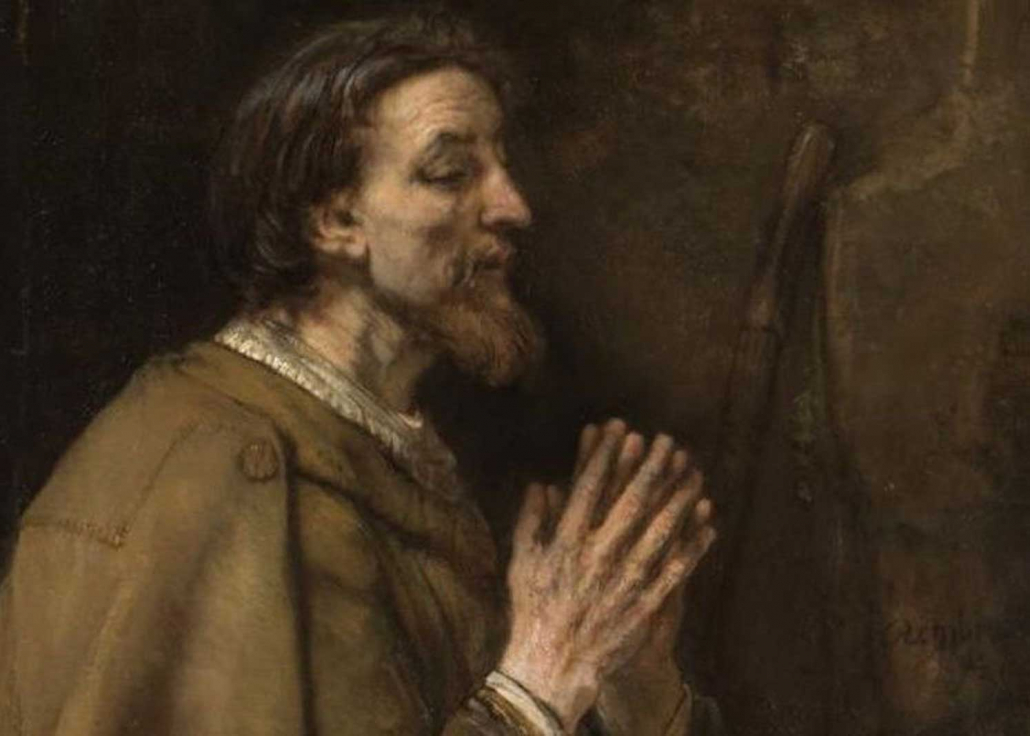St James the Elder by Rembrandt (1661). Public Domain.
‘And what do we mean by success?’
Andrew Collis
Ordinary Sunday 29, Year B
Mark 10:35-45
Brothers James and John, committed disciples and privileged witnesses, request/demand places of honour in the kindom. The episode stirs up memories and worries. We see what’s wrong with this ambition. It’s dispiriting, frightening. And very much a part of the competitiveness we know so well.
We have our own examples of blatant power-seeking. Bullies. Abusers. Narcissists. Misogynists. Powerful and pitiable characters, often with low self-esteem. Last week’s Four Corners exposé on Sony Music and Denis Handlin paints a picture of profit-seeking as psychopathy – a win-at-all-costs culture. And the costs are high.
It makes us angry to witness the exploitation of music and creativity, the exploitation of goodness – faith, hope and love …
In an interesting background to our gospel, the “Messianic Rule” from Qumran (1QSa) lays down detailed provisions for the final messianic banquet, with great attention to rank, honour and precedence (Donahue and Harrington).
The problem of power, it would seem, prefigures capitalism. Surely, though, we need alternative economic systems – cooperative, sustainable. Praise be to student strikers and activists for climate justice whose witness on Friday again urged responsible leadership and a net zero carbon emissions target by 2030, as well as revolutionary cultural change.
The questions are crucial, urgent: What is godly authority? What motivates us to work hard, to do good? And what do we mean by success?
We might also see that Jesus is teaching about prayer. The movement of prayer, from asking/desiring to hearing aloud our own desires, then allowing our desires to be queried … our desires reformed, transformed …
“Glory”, “cup”, “baptism” (with implications for “the other ten” [the congregation/community]) refer to the liturgy, to worship in the name and Spirit of Christ.
Jesus the Teacher/Exemplar calls us together (face-to-face and online, by word and sacrament) and recalls us to service (diakonia) – to generosity, with love for “the many”.
In the psalms and prophetic literature, “cup” refers to the fate that lies ahead of a person: what he or she will receive from the hand of God. “Baptism” evokes the biblical metaphor in which undergoing trials and dangers is depicted as a passage through turbulent waters.
Liturgical participation, as James and John will realise, is deeply existential, deeply social. “With Christ, we dare to be honest in our lives and to explore difficult questions together” (SSUC Mission Statement). Like Jesus, like James and John, we face death with (nothing but) radical trust in the goodness of God.
Where do we find ourselves?
Lockdown has meant added pressures. It has also, by grace, made us firmer friends. For this time of vigilant prayer and work, vigilant work and prayer, we give thanks to Christ whose way of service entails freedom (“ransom”).
God bless us now – in creating firmer and gentler ways to live and to love. Amen.




